THE
Page 96
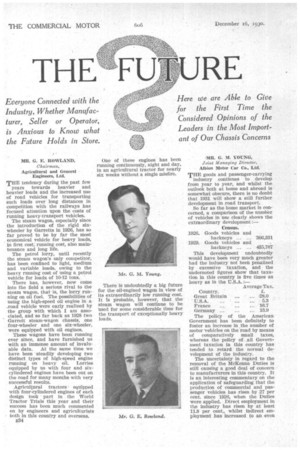
Page 97
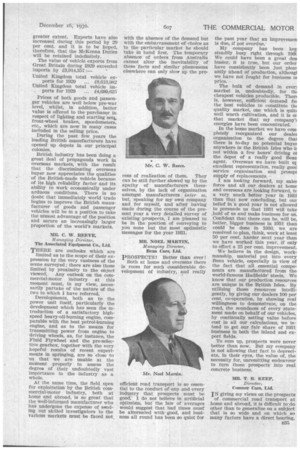
Page 98
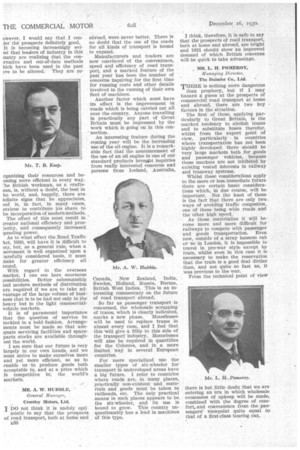
Page 99
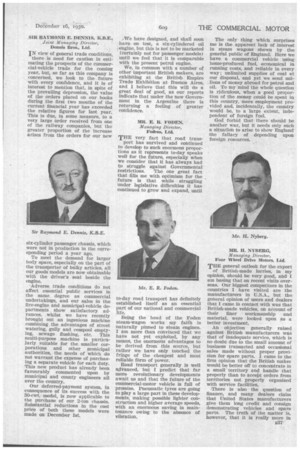
Page 100
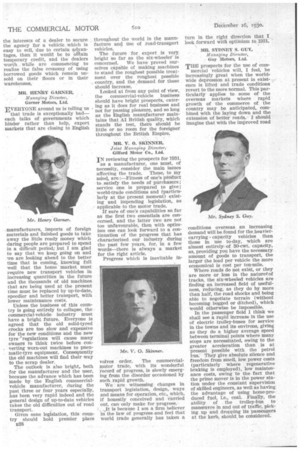
Page 101
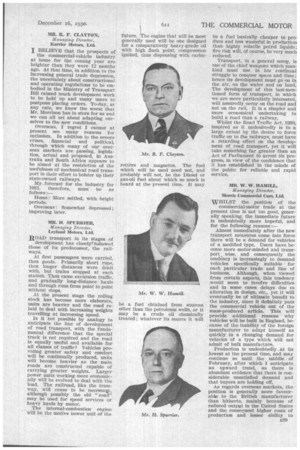
Page 102
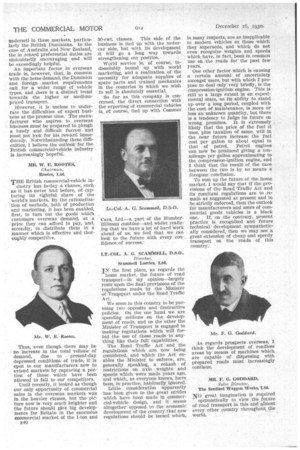
Page 103
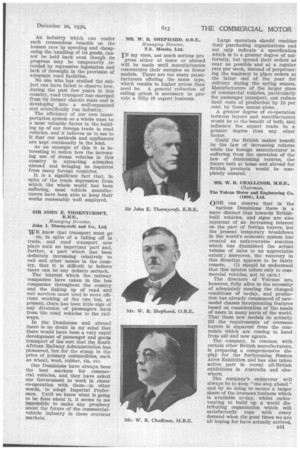
If you've noticed an error in this article please click here to report it so we can fix it.
TEE tendency during the past few
years towards heavier and heavier loads and the increased use of road vehicles for transporting such loads over long distances in competition with the railways has focused attention upon the costs of ri nning heavy-transport vehicles.
The steam wagon, especially since the introduction of the rigid sixwheeler by Garretts in 1926, has so far proved to be by far the most economical vehicle for heavy loads, in first cost; running cost, also maintenance and long life.
The petrol lorry, until recently the steam wagon's only competitor, has been confined to light, medium and variable loads, owing to the heavy running cost of using a petrol vehicle for loads of 10-12 tons.
There has, however, now come into the field a serious rival to the steam wagon, that is, the lorry running on oil fuel. The possibilities of using the high-speed oil engine in a .road vehicle were early realized by the group with which I am associated, and so far back as 1928 two Garrett steam-wagon chassis, one four-wheeler and one six-wheeler, were equipped with oil engines.
These wagons have been running ever since, and have furnished us with an immense amount of invaluable data. At the same time we have been steadily developing two distinct types of high-speed engine running on heavy oil. Lorries equipped by us with four and sixcylindered engines have been out on the road for many months with very successful results.
Agricultural tractors equipped with four-cylindered engines of each design took part in the World Tractor Trials this year and their success has been much commented on by engineers and agriculturists both in this country and overseas. E34 One of these engines has been running continuously, night and day, in an agricultural tractor for nearly six weeks without a single misfire.
There is undoubtedly a big future for the oil-engined wagon in view of its extraordinarily low running cost. It is probable, however, that the steam wagon will continue to be used for some considerable time for the transport of exceptionally heavy loads. MR. G. M. YOUNG, Joint Managing Director, • Albion Motor Car Co., Ltd.
THE goods and passenger-carrying industry continues to develop from year to year, and whilst the outlook both at home and abroad is somewhat obscure, there is no doubt that 1931 will show a still further development in road transport.
So far as the home market is concerned, a comparison of the number of vehicles in use clearly shows the extraordinary development : Census.
1926. Goods vehicles and hackneys ... ... 366,331 1929. Goods vehicles and hackneys ... ... 435,767 This development undoubtedly would have been very much greater had the industry not beet penalized by excessive taxation, and the undernoted figures show that taxation in this country is five times as heavy as in the U.S.A.:— Average Tax.
Country. £.
Great Britain ... 28.0 U.S.A. ... 5.3 France ... ... 16.7 Germany ... •-• ... 13.9 The policy of the American Government has been definitely to foster an increase in the number of motor vehicles on the road by means of comparatively small taxes, whereas the policy of all Government taxation in this country has tended to retard the normal development of the industry.
The uncertainty in regard to the removal of the McKenna Duties is still causing a good deal of concern to manufacturers in this country. It is an interesting commentary on the application of safeguarding that the production of commercial and passenger vehicles has risen by 27 per cent. since 1926, when the Duties were applied. Direct employment in the industry has risen by at least 11.8 per cent., whilst indirect employment has increased to an even
greater extent. Exports have also increased during this period by 29 per cent. and it is to be hoped, therefore, that the McKenna Duties will be retained indefinitely.
The value of vehicle exports from Great Britain during 1929 exceeded imports by £3,914,357:—
United Kingdom total vehicle ex ports for 1929 ... £8,613,982 United Kingdom total vehicle im ports for 1929 ... £4,699,625 Prices of both goods and passenger vehicles are well below pre-war level, whilst, in addition, better value is offered to the purchaser in respect of lighting and starting sets., front-wheel brakes, speedometers, etc., which are now in many cases included in the selling price.
During the past few years the leading British manufacturers have opened up depots in our principal colonies.
British industry has been doing a great deal of propaganda work in overseas markets, with the result that the discriminating overseas buyer now appreciates the qualities of the British-made vehicle because of its high reliability factor and its ability to work economically under arduous conditions. There is no doubt that immediately world trade begins to improve the British manufacturer of goods and passenger vehicles will be in a position to take the utmost advantage of the position and secure an increasingly larger proportion of the world's markets.
MR. C. W. REEVE, Managing Dirictor, The Associated Equipment Co., Ltd.
THERE are outlooks which are limited as to the scope of their expression by the very vastness of the scene surveyed ; there are also those limited by proximity to the object viewed. Any outlook on the commercial-motor industry at this moment must, in my view, necessarily partake of the nature of the two to which I have referred.
Developments, both as to the power unit itself, particularly the development which has seen the introduction of a satisfactory highspeed heavy-oil-burning engine, comparable with the best petrol-burning engine, and as to the means for transmitting power from engine to driving wheels, as, for instance, the Fluid Flywheel and the pre-selective gearbox, together with the very hopeful results of recent experiments in springing, are so close to us that we are unable at the moment properly to assess the degree of their undoubtedly vast importance to the industry as a whole.
At the same time, the field open for exploitation by the British commercial-motor industry, both at home and abroad, is so great that the well-informed manufacturer who has undergone the expense of sending out skilled investigators to the various markets must be faced not with the absence of the demand but with the embarrassment of choice as to the particular market he should take in hand first. The temporary absence of orders from Australia cannot alter the inevitability of these facts and similar phenomena elsewhere can only slow up the pro
cess of realization of them. They can be still further slowed up by the apathy of manufacturers themselves, by the lack of organization amongst manufacturers inter se, but, speaking for my own company and for myself, and after having made during the course of the present year a very detailed survey of existing prospects, I am pleased to be in the position of conveying to you none but the most optimistic messages for the year 1931.
MR. NOEL MARTIN, Managing Director, Bean Cars, Ltd.
PROSPECTS? Better than ever ! Both at home and overseas there is room for such considerable development of industry, and really efficient road transport is so essential to the conduct of any and every industry that prospects must be good. I do not believe in artificial optimism, but the law of averages would suggest that bad times must be alternated withgood, and business all round has been so quiet for
the past year that an improvemen is due; if not overdue;
My company has been kep steadily busy right through 193( We could have been a great des busier, it is true, but our order have consistently been just pleas antly ahead of production, althougl we have not fought for business oi price.
The bulk of demand in ever market is, undoubtedly, for tin cheapest vehicles producible. Then is, however, sufficient demand foi the best vehicles to constitute tin quality market, one which is quit{ well worth cultivation, and it is or that market that my company': energies have been concentrated.
In the home market we have completely reorganized our dealer organization to the degree that there is to-day no potential buyer anywhere in the British Isles who it not within a few hours' driving of the depot of a really good Bean agent. Overseas we have built uj excellent representation, really good service organization and prompt supply of replacements.
I am looking forward, my sales force and all our dealers at home and overseas are looking forward, te a very much better year in 1931 than that now concluding, but our belief in a good year is not allowed to persuade us that 1931 will take ,hold of us and make business for us. Confident that there can be, will be, better, bigger business in 1931 than could be done in 1930, we are resolved to plan, think, work at least 50 per cent, harder next year than we have worked this year, if only to effect a 25 per cent. improvement.
We believe in the design, workmanship, material put into every Bean vehicle, especially in view of the fact that all essential components are manufactured from the world-famous Hadfields' steels. We know that our production resources are unique in the British Isles. By utilizing those resources intelligently, by giving our dealers 100 per cent. co-operation, by showing real willingness to demonstrate, on the road, the soundness of every statement made on behalf of our vehicles, by continually setting value before cost in all our calculations, we intend to get our fair share of 1931 business in both the inland and export fields.
To sum up, prospects were never better than now. But my company is not allowing that fact to depreciate, in their eyes, the value of, the necessity for, unremitting endeavour to turn those prospects' into real concrete business.
MR. T. B. KEEP, Director, Commer Cars, Ltd.
IN giving my views on the prospects
of commercial road transport at home and abroad, it is difficult to-do other than to generalize on a subject that is so wide and on which so many factors have a direct bearing.
owever, I would say that I conJer the prospects definitely good. It is becoming increasingly eviait that leaders of industry in this • untry are realizing that the conrvative and out-of-date methods hich have been used in the past ive to be altered; They are re rganizing their resources and beoming more efficient in every way. he British workman, as a craftseau, is, without a doubt, the best in he world, and, happily, there are lefinite signs that he appreciates, Lad is, in fact, in many cases, miens to contribute his share to he incorporation of modern methods.
The effect of this must result in 4reater national efficiency and prosperity, and consequently increased Tending power.
As to what effect the Road Traffic ket, 1930, will have it is difficult to my, but, as a general rule, when a movement is well organized upon a -...arefully considered basis, it must iaake for greater efficiency all round.
With regard to the overseas market, I can see here enormous possibilities. Better salesmanship and modern methods of distribution are required if we are to take advantage of the large volume of business that is to be had not only in the heavy but in the light commercialvehicle markets.
It is of paramount importance that the question of service be tackled in a bold fashion. Arrangements must be made so that adequate servicing facilities and spareparts stocks are available throughout the world.
I am sure that our future is very largely in our own hands, and we must strive to make ourselves more and yet more efficient, so as to enable us to produce goods both acceptable to, and at a price which IS competitive in, the world's markets.
MR. A. W. RUBBLE,
Genera/ Manager, Crossley Motors, Ltd.
I DO not think it is unduly opti mistic to say that the prospects of road transport, both at hone and E30 abroad, were never better. There is no doubt that the use of the roads for all kinds of transport is bound to expand.
Manufacturers and traders are now convinced of the convenience, speed and efficiency of road transport, and a marked feature of the past year has been the number of concerns inquiring for the first time for running costs and other details involved in the running of their own fleet of machines.
Another factor which must have its effect is the improvement in roads which is being carried out all over the country. Anyone travelling in practically any part of Great Britain must be impressed by the work which is going on in this connection.
An interesting feature during the coming year will be the increasing use-of the oil engine. It is a remarkable fact that the announcement of the use of an oil engine in one of our standard products brought inquiries from really interested concerns and persons from Iceland, Australia,
Canada, New Zealand, India, Sweden, Holland, Russia, Burma, , British West Indies. This is an interesting commentary on the future of road transport abroad.
So far as passenger transport is concerned, the wholesale scrapping of trams, which is clearly indicated, marks a new phase. Motorbuses will be used to replace frau:is in almost every case, and I feel that this will give a fillip to this side of the transport industry. Motorbuses will also be required in quantities for the Colonies, and in a more limited way in several European countries.
For more specialized use the smaller types of six-wheeler for transport in undeveloped areas have a big future. I refer to countries where roads are, in many places, practically non-existent and materials and goods must be taken to railheads, etc. The only practical means in such places appears to be the six-wheeler, and its use is bound to grow. This country unquestionably has a lead in machines of this type.
I think, therefore, it is safe to say that the prospects of road transport, both at home and abroad, are bright and 1931 should show an improved demand of which British concerns will be quick to take advantage.
MR. L. H. POMMOY,
Managing Director,
The Daimler Co., Ltd.
THERE is nothing more dangerous
than prophecy, but if I may hazard a guess at the prospects of commercial road transport at home and abroad, there are two key factors in the situation.
The first of these, applying particularly to Great Britain, is the marked tendency to abolish trams and to substitute buses therefor, whilst from the export ppint of view, particularly in countries where transportation has not been highly developed, there should be very large markets both for goods and passenger vehicles, because these markets are not inhibited by existing vested interests in railway and tramway systems.
Whilst these considerations apply to the more or less immediate future there are certain basic considerations which, in due course, will be important. Not the least of these is the fact that there are only two ways of avoiding traffic congestion, one of these being wide roads and the other high speed. As these materialize it will become more and more difficult for railways to compete with passenger and goods transportation. Even now, outside of a stray hansom cab or so in London, it is impossible to travel in pre-war style except by train, whilst even in this case it is necessary to make the reservation that the train is a good deal dirtier than, and not quite so fast as, it was previous to the war.
From the technical point of view there is but little doubt that we are entering an era in which wholesale economies of upkeep will be made, combined with the degree of comfort. and convenience from the passengers' viewpoint quite equal to that of a first-class touring car.
SIR RAYMOND E. DENNIS, K.B.E.,
Joint Managing Director,
Dennis Bros., Ltd.
IN view of general trade conditions,
there is need for caution in estimating the prospects of the commercial-vehicle trade for the coming year, but, so far as this company is concerned, we look to the future with every confidence, and it is of interest to mention that, in spite of the prevailing depression, the value of the orders placed on our books during the first two months of the current financial year has exceeded the relative figures for last year. This is due, in some measure, to a very large order received from one of the railway companies, but the greater proportion of the increase arises from the orders for our new six-cylinder passenger chassis, which were not in production in the corresponding period a year ago.
To meet the demand for larger body space, especially on the part of the transporter of bulky articles, all our goods models are now obtainable with the driver's seat beside the engine.
'Adverse trade conditions do not affect essential public services in the same degree as commercial undertakings, and our sales in the fire-engine and municipal-vehicle departments show satisfactory advances, whilst we have recently brought out an ingenious machine combining the advantages of street watering, gully and cesspool emptying, sewage flushing, etc. This multi-purpose machine is particularly suitable for the smaller corporations and other municipal authorities, the needs of which do not warrant the expense of purchasing a separate vehicle for each duty. This new product has already been favourably commented upon by municipal and county engineers all over the country.
Our deferred-payment system, in consequence of its success with the 30-cwt. model, is ,now applicable to the purchase of our 2-ton chassis. Substantial reductions in the cost price of both these models were made on December 1st.
We have designed, and shall soon have on test, a six-cylindered oil engine, but this is not to be marketed (certainly not for passenger models) until we feel that it is comparable with the present petrol engine.
We, in common with a number of other important British makers, are exhibiting at the British Empire Trade Exhibition at Buenos Aires, and I believe that this will do a great deal of good, as our reports indicate that under the new Government in the Argentine there is returning a feeling of greater confidence.
MR. E. R. FM/EN,
Managing Director,
Fodens, Ltd.
THE very fact that road trans
port has survived and continued to develop to such enormous proportions as it represents to-day speaks well for the future, especially when we consider that it has always had to struggle against Governmental restrictions. The one great fact that fills me with optimism for the future is that while struggling under legislative difficulties it has continued to grow and expand, until
to-day road transport has definitely established itself as an essential part of our national and commercial life.
Being the head of the Foden steam-wagon works my faith is naturally pinned to steam engines_ I am more than convinced that we have not yet exploited, by any means, the enormous advantages to be derived from this source, but rather we have only touched the fringe of the cheapest and most reliable fOrm of power.
Road transport generally is well aslvanced, but I predict that far more revolutionary developments await us and that the future of the commercial-motor vehicle is full of promise. Pneumatic tyres are going to play a large part in these developments, making possible lighter construction and higher average speeds, with an enormous saving in maintenance owing to the absence of vibration.
The only thing which surprises me is the apparent lack of interest in steam wagons shown by the general public of England. Here we have a commercial vehicle using home-produced fuel, economical in running costs, and reliable in every way ; unlimited supplies of coal at our disposal, and yet we send millions of money abroad for petrol and oil. To my mind the whole question is ridiculous, when a good proportion of the money could be spent in this country, more employment provided and, incidentally, the country would be, to a large extent, independent of foreign fuel.
God forbid that there should be another war, but it needs only such a situation to arise to show England the fallacy of depending upon foreign resources.
MR. H. NYBERG,
Managing Director,
Four Wheel Drive Motors, Ltd.
THE general outlook for the export of British-made lorries, in my opinion, should be very good, and I am basing that on recent visits overseas. Our biggest competitors in the countries I have visited are the manufacturers in U.S.A., but the general opinion of users and dealers that I came in contact with was that British-made vehicles, on account of their finer workmanship and material, were looked upon as a better investment.
An objection generally raised against British manufacturers was that of inadequate service, which is no doubt due to the small amount of business transacted and occasional sales made without proper provision for spare parts. I came to the firm opinion that the British maker would be better off to concentrate in a small territory and handle that properly than to accebt orders from territories not properly organized with service facilities.
There is also the question of finance, and many dealers claim that United States manufacturers give them long credit and consign demonstrating vehicles and spare parts. The truth of the matter is, however, that it is really more in the interests of a dealer to secure the agency for a vehicle which is easy to sell, due to certain adyantages, than it would be to obtain temporary credit, and the dealers worth while are commencing to realize the false economy of using borrowed goods which remain unsold on their floors or in their warehouses, MR. HENRY GARNER, Managing Director, Garner Motors, Ltd.
EVERYONE around us is telling us that trade is exceptionally bad— each talks of governments which hinder rather than help, export markets that are closing to English -manufacturers, imports of foreign materials and finished goods to take away the little ready money which daring people are prepared to spend in a difficult period; but I am glad to say that we keep going on and we are looking ahead to the better time that is coming, knowing full well that the home ' market must require new transport vehicles in increasing quantities in the future and the thousands of old machines that are being used at the present time must be replaced by up-to-date, speedier and better transport, with lower maintenance costs.
Unless the business of this country is going entirely to collapse, the commercial-vehicle industry must have a bright future. Everyone is agreed that the old solid-tyred crocks are too slow and expensive for the new conditions and the new tyre '-regulations will cause many owners to think twice before converting worn-out machines to pneumatic-tyre equipment. Consequently the old machines will find their way to the scrap dealer.
The outlook is also bright,, both for the manufacturer and the user, because the advance which has been made by the English commercialvehicle manufacturer, during the past three or four years especially, has been very rapid indeed and the general design of up-to-date vehicles takes the old difficulties out of road transport.
Given sane legislation, this country should hold premier place E3 throughout the world in the manufacture and use of road-transport vehicles.
The future •for export is very bright so far as the six-wheeler is concerned. We have proved ourselves capable of making machines to stand the roughest possible treatment over the roughest possible country, and the demand for these should increase.
Looked at from any point of view, the commercial-vehicle business should have bright prospects, catering as it does for real business and not for passing pleasure, and so long as the English manufacturer maintains that Al British quality, which stands the test, there should be little or no room for the foreigner throughout the British Empire.
MR. V. 0. SKINNER, Joint Managing Director, Gilford Motor Co., Ltd.
IN reviewing the prospects for 1931, as a manufacturer, one must, of necessity, consider the main issues affecting the trade. These, to my mind, are :—Fitness of one's product to satisfy the needs of purchasers ; service one is prepared to give ; world-trade conditions and (particularly at the present moment) existing and impending legislation, as applicable to the motor trade.
If sure of one's capabilities so far as the first two essentials are concerned, and the latter two are not too unfavourable, then with optimism one can look forward to a continuation of the progress that has characterized our industry during the past few years, for, in a few words—there is always a market for the right article.
Progress which is inevitable in volves order. The commercialmotor trade, with its wonderful record of progress, is slowly emerging from the disorder occasioned by such rapid growth.
We are witnessing changes in transport legislation, design, ways and means for operation, etc., which, if honestly conceived and carried out, can only make for progress.
' „It is because I am a firm believer in the law of progress. and feel that world trade generally has taken a turn in the right direction that I . look forward with optimism to 1031.
MR. SYDNEY S. GUY, M. (mulling Director, Guy MotoM Ltd.
THE prospects for the use of com mercial vehicles will, I feel, be increasingly great when the worldwide depression at present in existence is lifted and trade conditions revert to the more normal. This particularly applies to some of the overseas markets where rapid growth of the commerce of the country may be anticipated, combined with the laying down and the extension of better roads. I should imagine that with the improved road conditions overseas an increasing demand will be found for the heavier. carrying capacity vehicles than those in use to-day, which are almost entirely of 30-cwt. capacity, as, providing you have the necessary amount of goods to transport, the larger the load per vehicle the more economical is cost per ton-mile.
Where roads do not exist, or they are more or less in the nature0, of tracks, the six-wheeled vehicles are finding an increased field of usefulness, reducing, as they do by more than half, the road shocks and being able to negotiate terrain (without becoming bogged or ditched), which would otherwise be impossible.
In the passenger field I think we shall see a rapid increase in the use of electric trolley-buses for service in the towns and its environs, giving as they do a higher average speed between terminal points where many stops are necessitated, owing to the greater acceleration than is at present possible with the petrol bus. They give absolute silence and freedom from smell, low power costs (particularly where regenerative braking is employed), low maintenance costs, owing to the fact that the prime mover is in the power station under the constant supervision of skilled engineers, as well as having the advantage of using home-produced fuel, i.e., coal. Finally, the ability of the trolley-bus to raanceuvre in and out of traffic, picking up and dropping its passengers at the kerb, should be considered. MR. R. F. CLAYTON, Managing Director, Harrier Motors, Ltd.
I BELIEVE that the prospects of the commercial-vehicle industry at home for the coming year are brighter than they were 32 months ago. At that time, in addition to the increasing general trade depression, the uncertainty about constructional and operating regulations to be embodied in the Ministry of Transport Bill caused much development work to be held up and many' users to postpone placing orders. To-day, at any rate, we know the worst that Mr. Morrison has in store for us and we can all set about adapting ourselves to the new conditions.
Overseas, I regret I cannot at present see many reasons for optimism. In addition to the severe crises, financial and political, through which many of our overseas markets are passing, legislation, actual and proposed, in Australia and South Africa appears to be aimed at the restriction of the usefulness of mechanical road transport in their effort to bolster up their state-owned railways.
My.forecast for the industry for 1931, therefore, must be as follows : Home: More settled, with bright periods.
Overseas : Somewhat depressed ; improving later.
MR. H. SPURRIER, Managing Direetor, Leyland Motors, LW.
ROAD transport in its stages of development has closelyefollowed those of its predecessor, the railways.
Al; first passengers were carried, then goods. Primarily short runs, then longer distances were dealt with, but trains stopped at each station. Then came excursion traffic, and gradually long-distance hauls and through runs from point to point without stops.
At the present stage the rolling stock has become more elaborate, units are heavier and the road relaid to deal with increasing weights travelling at increasing speed.
Is it not possible by analogy to anticipate the line of development of road transport, with the fundamental difference that the special track is not required and the road is equally useful and available for all classes of traffic? Vehicles providing greater safety and comfort will be continually produced, units will become heavier as the main roads are constructed capable of carrying greater weights. Larger power units working more economically will be evolved to deal with the load. The railroad, like the tramway, will cease to be necessaly, although possibly the old "road" may be used for speed services or heavy hauls by motor. The internal-combustion engine will be the motive nower unit of the future. he engine that will be most generally used will be one designed for a comparatively heavy-grade oil With high flash point, compression ignited, thus dispensing with carbu
retters and magnetos. The fuel. which will be used need not, and probably will not, be the Diesel or gas-oil fuel about which so much is heard at the present time. It may
be a fuel obtained from sources other than the petroleum wells, or it may be a crude oil chemically treated ; whatever its source it will
be a fuel basically cheaper to produce and less wasteful in production than highly volatile petrol liquids ; fire risk will, of course, be very much reduced.
Transport, in a general sense, is one of the chief weapons which mankind must use in his continual struggle to conquer space and time ; hence its development must go on in the air, on the water and on land. The development of this last-mentioned form of transport, in which we are more particularly interested, will assuredly occur on the road and not on the rail. It is a simpler and more economical undertaking to build a road than a railway,
Whilst the Road Traffic Act, 1930, inspired as it undoubtedly is to a large extent by the desire to force traffic on to the railways, must have a retarding effect on the development of road transport, yet It will take something far greater than an Act of Parliament to arrest its progress, in view of the confidence that it has established in the minds of the public for reliable and rapid service. •
MR. W. W. HAMILL, Managing Director, Morris Commercial Cars, Ltd.
WHILST the position of the
commercial-motor trade at the present time is not too good, generally speaking, the immediate future is undoubtedly more hopeful, and for the following reasons :— Almost immediately after the new transport measures come into force there will be a demand for vehicles of a modified type. Users have become more motor-minded and transport wise, and consequently the tendency is increasingly to demand vehicles specifically suitable ' for each particular trade and line of business. Although, when viewed from certain aspects, this tendency mould seem to involve difficulties and in some cases delays due to alteration in design, etc., yet it will eventually be of ultimate benefit to the industry, since it definitely puts the commercial vehicle out of the mass-produced article. This will provide additional reasons why vehicles will be built in England, because of the inability of the foreign manufacturer to adapt himself as quickly to a changing demand for vehicles of a type which will not admit of bulk manufacture.
Production is undoubtedly at its lowest at the present time, and may continue so until the middle of February. after which I anticipate an upward trend, as there is abundant evidence that there is considerable unsatisfied demand and that buyers are holding off.
As regards overseas markets, the position is generally more favourable to the British manufacturer than hitherto, mainly because of reduced output in the United States and the consequent higher costs of production and lesser ability to undersell in these markets, particularly the British Dominions. In the case of Australia and New Zealand, the in .reased preferential duties are • undoubtedly encouraging and will be exceedingly helpful.
An important factor in overseas trade is, however, that, in common with the home demand, the Dominion and foreign market requirements call for a wider range of vehicle types, and there is a distinct trend towards the higher or mediumpriced transport.
However, it is useless to underrate the difficulties of export business at the present time. The Manufacturer who aspires to overseas business must be prepared to plough a lonely, and difficult furrow and must not look for his reward imnaediately. Notwithstanding these difficulties, I believe the outlook for the British commercial-vehicle industry is increasingly hopeful.
MR. W. E. RI)OTES, Chairman, Rootes, LW.
THE British commercial-vehicle in
dustry has to-day a chance, such as it has never had before, of capturing its rightful share of the world's markets. By the rationalization of methods, both of production and marketing, it has been enabled, first, to turn out the goods which customers overseas demand, at a price they can afford to pay, and, secondly, to distribute them in a manner which is effective and thoroughly competitive.
Thus, even though there may be no increase in the total volume of demand, due to present-day depressed conditions of trade, it is open to our manufacturers now to extend markets by capturing a portion of those which have been allowed to fall to our competitors.
Until recently, it looked as though our only opportunity of commercial sales in the overseas markets was in the heavier classes, but the picture now is very much brighter and the future should give big developments for Britain in the enormous commercial Market of the 1-ton and
E40 30-cwt: classes. This side of the business is tied up with the motorcar side, but with its development it will go a long way towards strengthening our position.
World service is, of course, indissolubly bound up with world marketing, and a realization of the necessity for adequate supplies of spare parts and trained mechanics in the countries in which we wish to sell is absolutely essential.
So far as this company is concerned, the direct connection with the exporting of commercial vehicles is, of course, tied up with Commer Cars, Ltd.—a part of the HumberHillman combine—and whilst realizing that we have a lot of hard work ahead of us, we feel that we can look to the future with every con-, lidence of success.
LT.-COL. A. G. SCAMMELL, D.S.O., Director,
Seammell Lorries, Ltd.
IN the first place, as regards the home market, the future of road transport—in my opinion—largely rests upon the final provisions of the regulations made by the Minister of Traisport under the Road Traffic Act.
We seem in this country to be pursuing two opposite and destructive policies. On the one hand we are spending millions on the development of roads, and on the other the Minister of Transport is engaged in making regulations which will forbid the use of these roads to" anything like their full capabilities.
The Road Traffic Act and the regulations which are now being considered, and which the Act enables the Minister to enforce, are, generally speaking, a rehash of restrictions on axle weights and speeds which were made years ago, and which, as everyone knows, have been, in practice, habitually ignored.
Little consideration apparently has been given to the great strides which have been made in commercial-vehicle design, and it seems altogether opposed . to the • economic development of the country that new regulationsshould be issued which, in many respects, are as inapplicable to modern vehicles as those which they supersede, and which do not even recognize weights and speeds which have, in fact, been in common use on the roads for the past few years.
One other factor which is causing a certain amount of uncertainty amongst users, but with which I propose to deal only very briefly, is the compression-ignition engine. This is still to a large extent in an experimental state, as its ability to stand up over a long period, coupled with the cost of maintenance, is more or less an unknown quantity, but there is a tendency to judge its future on wrong premises. It is extremely likely that the price of the fuel it uses, plus taxation of same, will in the near future increase the fuel cost per gallon to about equal to that of petrol. Petrol engines can now be produced giving a tonmileage per gallon approximating to the compression-ignition engine, and I think that the result of the race between the two is by no means a foregone conclusion.
To sum up the future of the home market. I would say that if the provisions of the Road Traffic Act and its resultant regulations are to remain as suggested at present and to be strictly enforced, then the outlook for manufacturers and users of commercial goods vehicles is a black one. If, on the contrary, present practice is recognized and future technical development sympathetically considered, then we may see a great extension Of cheap and speedy transport on the roads of this country.
As regards prospects overseas, I think the development of roadless areas by means of machines which are capable of dispensing with prepared roads must increasingly continue.
MR. F. G. GODDARD, Sales. Director,
The Sentinel Waggon Works, Ltd.
NO great imagination is required
optimistically to view the future of road transport in this and almost every other country throughout the world.
An industry which can confer such tremendous benefits on the human race by speeding and cheapening the handling of its goods, cannot be held back even though its progress may be temporarily retarded by repressive legislation and lack of foresight in the provision of adequate road facilities.
No one who has studied the subject can have failed to observe how, during the past few years in this country, road transport has emerged from its former chaotic state and is developing into a well-organized and scientifically run industry.
The efficiency of our own transportation system as a whole must be a most valuable factor in the building up of our foreign trade in road vehicles, and it behoves us to see to it that our methods and appliances are kept continually in the lead.
As an example of this it is interesting to notice how the increasing use of steam vehicles in this country is attracting attention abroad and bringing us inquiries from many foreign countries.
It is a significant fact that, in spite of the trade depression from which the whole world has been suffering, most vehicle manufacturers have been able to keep their works reasonably well employed.
SIR JOHN E. THORNYCROFT, H.B.E., Managing Director, John I. Thornycroft and Co., Ltd.
WE know that transport must go on, in spite of a falling off in trade, and road transport now plays such an important part and, further, a part which has been definitely increasing relatively to rail and other means in the country, that it is difficult to believe there can be any definite setback.
The interest which the railway companies have taken in the bus companies throughout the country and the linking up of road and rail services must tend to more efficient working of the two but, at present, there has been little sign of any diversion of passengers back from the road vehicles to the railways.
In the Dominions and abroad there is no doubt in my mind that there would have been a very rapid development of passenger and goods transport of the sort that the South African Railway Administration has pioneered, but for the slump in the price of. primary commodities, such as wheat, wool, rubber, tin, etc.
Our Dominions have always been the best markets for commercial vehicles, and they have asked our Government to work in closer co-operation with them—in other words, to adopt Imperial Preference. Until we know what is going to be done about it, it seems to me impossible to make any prophecy about the future of the commercialvehicle industry in these overseas markets. MR. W. R. SHEPHARD, 0.B.E., Managing Director, T.S. Motors, Ltd.
IN my view, not much serious pro gress either at home or abroad•will be made until manufacturers
concentrate their energies on fewer models. There are too many manufacturers offering the same type, which results in higher prices than need be. A general reduction of selling prices is necessary to provide a fillip tf, export business. Large operators should combine their purchasing organizations and not only indicate a specification which is to a greater degree of uniformity, but spread their orders as near as possible and at a regular rate per week, instead of perpetuating the tendency to place orders at the latter end of the year for delivery during the spring season. Manufacturers of the larger sizes of commercial vehicles, particularly for passenger transport, can reduce their costs of production by 10 per cent. by these means alone.
A greater degree of co-operation between buyers and manufacturers would be to the benefit of both, and. influence the export trade to a greater degree than any other factor.
Could the British maker benefit by the law of increasing returns while the foreign manufacturer is suffering from the operation of the law of diminishing returns, the future both at home and abroad for British products would be completely assured.
MR. W. R. CHALLINOR, M.B.E., Chairman, The Vulcan Motor and Engineering Co. (1906), Ltd.
ONE can observe that in the
various Dominions there is a more distinct bias towards Britishbuilt vehicles, and signs are also apparent of an increasing interest on the part of foreign buyers, but the present temporary breakdown in the world's economic system has created an unfavourable reaction which has diminished the actual volume of sales to an appreciable extent; moreover, the recovery in this direction appears to be fairly remote. (It should be understood that this opinion refers only to commercial vehicles, not to cars.) The directors of Vulcans are, however, fully alive to the necessity of adequately meeting the changed conditions of to-day, and production has already commenced of newmodel chassis incorporating features based on consideration of the needs of users in many parts of the world. That these new models do actually fill the requirements of overseas buyers is apparent from the comments which are coming to hand from old and new agents.
The company, in common with certain other British manufacturers, is preparing a comprehensive display for the forthcoming Buenos Aires Exhibition and has also taken active part in recent all-British exhibitions in Australia and elsewhere.
The company's endeavour will always be to keep "one step ahead" and by so doing to secure a larger share of the overseas business which Is available to-day, whilst endeavouring to build up a world distributing organization which will satisfactorily cope with every demand when the good times we are all hoping for have actually arrived.




















































































































































































